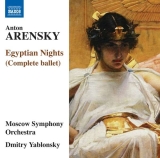Anton Arenskys Ballett Ägyptische Nächte wurde 1908 am Mariinsky-Theater in St. Petersburg in der Choreographie von Fokin uraufgeführt. Es basiert auf dem Gedicht ‘Kleopatra und ihre Liebhaber’, das Puschkin als ‘Improvisation’ in seine Erzählung Ägyptische Nächte eingefügt hatte. Es geht um den jungen Amoun, der Berenice heiraten soll und sich in Kleopatra verliebt. Er sagt ihr, er würde sein Leben für einen Kuss geben. Zu einer lyrischen Melodie gibt sie ihm zu verstehen, dass sie seinen Wunsch erfüllen wird, dass er aber beim ersten Tageslicht durch Gift sterben müsse.
Berenice bittet Kleopatra, Amoun zu begnadigen. Amoun nähert sich Kleopatra, die ihm den vergifteten Becher bringen lässt. Der Hohepriester hat jedoch den Trank ausgetauscht und Amoun wird bloß ohnmächtig. Dann kehrt Antonius zu Kleopatra zurück. Das Finale zeigt die Abreise von Antonius und Kleopatra, die in mit Rosengirlanden geschmückten Booten davonsegeln. Nun kommt Amoun wieder zu sich und begreift, wie unbedacht er gewesen ist. Er wirft sich Berenice zu Füßen, die ihm verzeiht. Zwischen diesem Handlungsstrang sorgt eine Reihe von Tänzen für Abwechslung.
Arensky hat dafür eine gefällige, wenn auch nicht unbedingt nachhaltig auf den Zuhörer einwirkende Musik geschrieben. Neben der feierlichen, manchmal imposanten Musik, die mit den Auftritten der Königin und von Marcus Antonius einhergeht, suggeriert die Musik oft sensuelle, zarte und sehr stimmungsträchtige Nächte in exotischer Umgebung.
Das Moskauer Symphonieorchester legt unter Dmitry Yablonskys Leitung eine opulente, tief romantische Interpretation vor.
Anton Arensky’s ballet Egyptian Nights was premiered at the Mariinsky Theater in St. Petersburg in 1908, in a choreography by Fokin. It is based on the poem ‘Cleopatra and Her Lovers’, which Pushkin had inserted as an ‘improvisation’ in his story Egyptian Nights. It is about young Amoun, who is to marry Berenice and falls in love with Cleopatra. He tells her he would give his life for a kiss. To a lyrical melody, she makes him understand that she will fulfill his wish, but that he must die by poison the following morning.
Berenice asks Cleopatra to pardon Amoun. Amoun approaches Cleopatra, who has the poisoned cup brought to him. However, the high priest has substituted the potion and Amoun merely faints. Then Marcus Antonius returns to Cleopatra. The finale shows the departure of Antony and Cleopatra, who sail away in boats decorated with garlands of roses. Now Amoun regains consciousness and realizes how stupid he has been. He throws himself at the feet of Berenice, who forgives him. Between this plot line, a series of dances provides variety.
Arensky has written pleasing music for them, though not necessarily one that has a lasting effect on the listener. In addition to the solemn, sometimes imposing music that accompanies the performances of the Queen and Marcus Antonius, the music often suggests sensual, tender, and very atmospheric nights in exotic surroundings.
The Moscow Symphony Orchestra, under Dmitry Yablonsky’s direction, presents an opulent, deeply romantic interpretation.
























